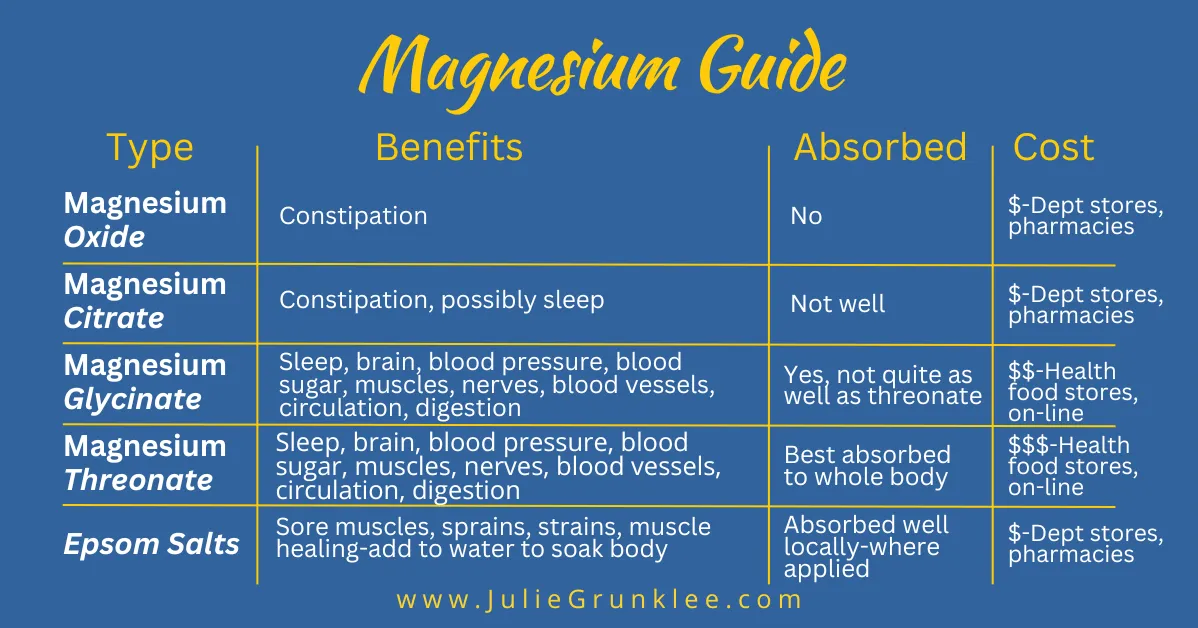· Wellness · 6 min read
Different Forms & Benefits of Magnesium
Many people ask me what I think of magnesium and if I think it would help them or not. In short, my answer is usually “yes.” But, there’s more to it than just a simple yes or no. Magnesium has several different forms with very different effects. In this article I explain what magnesium is, list the most common forms as well as the benefits of each of these types.

April’s theme is Emerge-or more precisely Pop-Up! Like all the new life popping up in God’s Creation & in the garden of your heart during the Easter season. One requirement you need for the energy to start your day feeling refreshed & ready to serve the Lord is getting a good night’s sleep and ensuring your body is functioning at its best. Magnesium can help with that in many ways.
Many people ask me what I think of magnesium and if I think it would help them or not. In short, my answer is usually “yes.” But, there’s more to it than just a simple yes or no. Magnesium has several different forms with very different effects. In this article I explain what magnesium is, list the most common forms as well as the benefits of each of these types.
What is Magnesium?
Magnesium is a mineral that most people actually don’t get enough of anymore. (Some heath authorities authorities disagree with me.) Personally, I also feel people don’t and maybe can’t get enough of it through food. The RDA (Recommended Daily Allowance) for vitamins & minerals are the minimum needed to prevent severe deficiency disease, not for optimal body functioning.
Why don’t we get enough anymore? Because magnesium is a mineral naturally found in soil & water. Hard water. You know that water that leaves limescale deposits on things.
Over the last 50 – 100 years most people in the US soften their water-taking the magnesium (and calcium) out of it so it doesn’t ruin our dishwashers, washing machines, toilets, tubs, faucets, etc. Cities do this and if you live in the country your Rural Water provider does this. If you do use well water, you probably have a water softener to filter & treat your water as well as protect your appliances.
I for one, am glad my appliances are lasting longer. But let’s take a deeper dive into what magnesium actually does for the body.
Magnesium Benefits
Magnesium is touted as one of those ‘miracle’ supplements. The truth is, your body requires magnesium for hundreds of functions. Namely creating enzymes, proteins, muscle & nerve function, regulating blood sugar & blood pressure, creating energy, bone development, hormone balance, and hundreds of other things, including relaxation & sleep.
Some forms of magnesium are better absorbed than others. Those that are better absorbed, get to the tissues and help with those functions listed above. Those that don’t absorb so well (that tend to stay in the intestine) draw water to itself and are great for constipation.
So it’s important to know why you want to take magnesium so you know which type to look for and where to look.
Less Absorbed Forms of Magnesium
You’ll want to check the label to know which kind of magnesium is in the specific supplement or multivitamin. You should see it listed in the Drug Facts or Active Ingredients. However it may be in the Inactive Ingredients or just ingredients list.
Magnesium Oxide is the least expensive type of magnesium and one you’ll find in most supplements and/or multivitamins. It’s not absorbed well into the body. It stays in the intestine and draws water to itself making stools easier to pass, and if you take too much you may have diarrhea.
I like using Magnesium Oxide better than Miralax or other stool softeners. You can easily find it at most department stores & pharmacies, often times in 250 or 400 mg tablets. I usually buy the cheapest bottle at Walmart, Target or Dollar General.
It’s not only much cheaper than Miralax, it’s easy to adjust how much you need and you can just add it to the other supplements you take, rather than having to remember to mix a drink, or remember a powder when you’re on vacation. Most people can take up to 1,000mg a day without adverse effects (other than possibly diarrhea). You can take 500mg twice a day or 250mg 4 times a day or 1,000mg at night. If diarrhea starts-back off.
Magnesium Citrate is a bit more expensive than the Oxide form, and absorbs into the body a bit better, but not by much. Again, many will disagree with me, but if it readily causes diarrhea/softer/looser stools, it’s staying in the intestine & not absorbing into the body. Citrate is also widely available in most department stores & pharmacies. It’s also the active ingredient in the Calm powder supplement.
Better Absorbed Forms of Magnesium
Magnesium Threonate is the best absorbed form and the most expensive. When I started taking Magnesium Threonate about 10 years ago, the first thing I noticed was my hands & feet were warmer. (I have Raynaud’s Syndrome.) This form of magnesium relaxes the blood vessels, helps circulation and also helped relax me more in general and get a better night’s sleep.
Magnesium Threonate is the form that helps all those other things listed above as well as restless leg syndrome, muscle cramps & tension as well as migraines.
Most people can take the recommended dose on the bottle without issues. Some people can get by using a lower dose. I usually get the Now Foods brand (Magtein), but have also found Life Extensions & BlueBonnet (no, not the margarine) good, too.
Magnesium Glycinate or BiGlycinate are also better absorbed forms, but less expensive than Threonate. I find it doesn’t work quite as well as the Threonate, but works well for my Favorite Handyman. Especially on those days he’s been on a ladder and is more prone to leg cramps in the middle of the night. (Staying hydrated with plenty of water and stretching those calf muscles also helps!)
Magnesium Sulfate, aka Epsom salts, is another well known form of magnesium. It is fairly well absorbed in warm water & great for sore muscles. It’s easy enough to add to a bath. You can also plug the drain when you’re taking a shower, pour a cup into the water & let your feet soak while you’re washing.
So which magnesium should you use?
It really depends on what’s bothering you. I personally use both Oxide and Threonate. Occasionally, I also use some Epsom salts in the shower as a foot soak or in the tub for a whole body soak. I’ve tried Citrate & Glycinate, finding they didn’t work so well for me. My hands weren’t as warm and let’s just say I didn’t notice any extra benefit to paying more for the Citrate over the Oxide. But every body is different. You’ll have to do what works best for you.
Here’s a chart to help you figure out which type(s) of magnesium may help you the most.

Word of Caution
And of course with any supplements, it’s always a good idea to talk to your doctor beforehand. Especially if you are pregnant. Magnesium Sulfate is given IV (in the vein) to women experiencing preterm labor in an effort to slow or stop it. (Relaxes the muscles in the uterus.) There are other things to consider too. Don’t just take magnesium without consulting with your doctor!
Have you ever used magnesium? What benefit did/do you notice? What type/form did you use? Is there a particular brand you prefer? Share with us in the comments! Help us all learn more & enjoy the journey!




